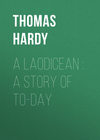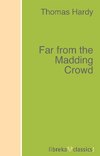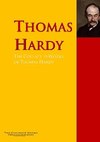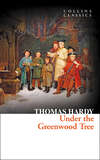Kitabı oku: «A Laodicean : A Story of To-day», sayfa 11
Fortune as usual helped him in his dilemma. Entering Havill’s office, Dare found him sitting there; but the drawings had all disappeared from the boards. The architect held an open letter in his hand.
‘Well, what news?’ said Dare.
‘Miss Power has returned to the castle, Somerset is detained in London, and the competition is decided,’ said Havill, with a glance of quiet dubiousness.
‘And you have won it?’
‘No. We are bracketed – it’s a tie. The judges say there is no choice between the designs – that they are singularly equal and singularly good. That she would do well to adopt either. Signed So-and-So, Fellows of the Royal Institute of British Architects. The result is that she will employ which she personally likes best. It is as if I had spun a sovereign in the air and it had alighted on its edge. The least false movement will make it tails; the least wise movement heads.’
‘Singularly equal. Well, we owe that to our nocturnal visit, which must not be known.’
‘O Lord, no!’ said Havill apprehensively.
Dare felt secure of him at those words. Havill had much at stake; the slightest rumour of his trick in bringing about the competition, would be fatal to Havill’s reputation.
‘The permanent absence of Somerset then is desirable architecturally on your account, matrimonially on mine.’
‘Matrimonially? By the way – who was that captain you pointed out to me when the artillery entered the town?’
‘Captain De Stancy – son of Sir William De Stancy. He’s the husband. O, you needn’t look incredulous: it is practicable; but we won’t argue that. In the first place I want him to see her, and to see her in the most love-kindling, passion-begetting circumstances that can be thought of. And he must see her surreptitiously, for he refuses to meet her.’
‘Let him see her going to church or chapel?’
Dare shook his head.
‘Driving out?’
‘Common-place!’
‘Walking in the gardens?’
‘Ditto.’
‘At her toilet?’
‘Ah – if it were possible!’
‘Which it hardly is. Well, you had better think it over and make inquiries about her habits, and as to when she is in a favourable aspect for observation, as the almanacs say.’
Shortly afterwards Dare took his leave. In the evening he made it his business to sit smoking on the bole of a tree which commanded a view of the upper ward of the castle, and also of the old postern-gate, now enlarged and used as a tradesmen’s entrance. It was half-past six o’clock; the dressing-bell rang, and Dare saw a light-footed young woman hasten at the sound across the ward from the servants’ quarter. A light appeared in a chamber which he knew to be Paula’s dressing-room; and there it remained half-an-hour, a shadow passing and repassing on the blind in the style of head-dress worn by the girl he had previously seen. The dinner-bell sounded and the light went out.
As yet it was scarcely dark out of doors, and in a few minutes Dare had the satisfaction of seeing the same woman cross the ward and emerge upon the slope without. This time she was bonneted, and carried a little basket in her hand. A nearer view showed her to be, as he had expected, Milly Birch, Paula’s maid, who had friends living in Markton, whom she was in the habit of visiting almost every evening during the three hours of leisure which intervened between Paula’s retirement from the dressing-room and return thither at ten o’clock. When the young woman had descended the road and passed into the large drive, Dare rose and followed her.
‘O, it is you, Miss Birch,’ said Dare, on overtaking her. ‘I am glad to have the pleasure of walking by your side.’
‘Yes, sir. O it’s Mr. Dare. We don’t see you at the castle now, sir.’
‘No. And do you get a walk like this every evening when the others are at their busiest?’
‘Almost every evening; that’s the one return to the poor lady’s maid for losing her leisure when the others get it – in the absence of the family from home.’
‘Is Miss Power a hard mistress?’
‘No.’
‘Rather fanciful than hard, I presume?’
‘Just so, sir.’
‘And she likes to appear to advantage, no doubt.’
‘I suppose so,’ said Milly, laughing. ‘We all do.’
‘When does she appear to the best advantage? When riding, or driving, or reading her book?’
‘Not altogether then, if you mean the very best.’
‘Perhaps it is when she sits looking in the glass at herself, and you let down her hair.’
‘Not particularly, to my mind.’
‘When does she to your mind? When dressed for a dinner-party or ball?’
‘She’s middling, then. But there is one time when she looks nicer and cleverer than at any. It is when she is in the gymnasium.’
‘O – gymnasium?’
‘Because when she is there she wears such a pretty boy’s costume, and is so charming in her movements, that you think she is a lovely young youth and not a girl at all.’
‘When does she go to this gymnasium?’
‘Not so much as she used to. Only on wet mornings now, when she can’t get out for walks or drives. But she used to do it every day.’
‘I should like to see her there.’
‘Why, sir?’
‘I am a poor artist, and can’t afford models. To see her attitudes would be of great assistance to me in the art I love so well.’
Milly shook her head. ‘She’s very strict about the door being locked. If I were to leave it open she would dismiss me, as I should deserve.’
‘But consider, dear Miss Birch, the advantage to a poor artist the sight of her would be: if you could hold the door ajar it would be worth five pounds to me, and a good deal to you.’
‘No,’ said the incorruptible Milly, shaking her head. ‘Besides, I don’t always go there with her. O no, I couldn’t!’
Milly remained so firm at this point that Dare said no more.
When he had left her he returned to the castle grounds, and though there was not much light he had no difficulty in discovering the gymnasium, the outside of which he had observed before, without thinking to inquire its purpose. Like the erections in other parts of the shrubberies it was constructed of wood, the interstices between the framing being filled up with short billets of fir nailed diagonally. Dare, even when without a settled plan in his head, could arrange for probabilities; and wrenching out one of the billets he looked inside. It seemed to be a simple oblong apartment, fitted up with ropes, with a little dressing-closet at one end, and lighted by a skylight or lantern in the roof. Dare replaced the wood and went on his way.
Havill was smoking on his doorstep when Dare passed up the street. He held up his hand.
‘Since you have been gone,’ said the architect, ‘I’ve hit upon something that may help you in exhibiting your lady to your gentleman. In the summer I had orders to design a gymnasium for her, which I did; and they say she is very clever on the ropes and bars. Now – ’
‘I’ve discovered it. I shall contrive for him to see her there on the first wet morning, which is when she practises. What made her think of it?’
‘As you may have heard, she holds advanced views on social and other matters; and in those on the higher education of women she is very strong, talking a good deal about the physical training of the Greeks, whom she adores, or did. Every philosopher and man of science who ventilates his theories in the monthly reviews has a devout listener in her; and this subject of the physical development of her sex has had its turn with other things in her mind. So she had the place built on her very first arrival, according to the latest lights on athletics, and in imitation of those at the new colleges for women.’
‘How deuced clever of the girl! She means to live to be a hundred!’
VII
The wet day arrived with all the promptness that might have been expected of it in this land of rains and mists. The alder bushes behind the gymnasium dripped monotonously leaf upon leaf, added to this being the purl of the shallow stream a little way off, producing a sense of satiety in watery sounds. Though there was drizzle in the open meads, the rain here in the thicket was comparatively slight, and two men with fishing tackle who stood beneath one of the larger bushes found its boughs a sufficient shelter.
‘We may as well walk home again as study nature here, Willy,’ said the taller and elder of the twain. ‘I feared it would continue when we started. The magnificent sport you speak of must rest for to-day.’
The other looked at his watch, but made no particular reply.
‘Come, let us move on. I don’t like intruding into other people’s grounds like this,’ De Stancy continued.
‘We are not intruding. Anybody walks outside this fence.’ He indicated an iron railing newly tarred, dividing the wilder underwood amid which they stood from the inner and well-kept parts of the shrubbery, and against which the back of the gymnasium was built.
Light footsteps upon a gravel walk could be heard on the other side of the fence, and a trio of cloaked and umbrella-screened figures were for a moment discernible. They vanished behind the gymnasium; and again nothing resounded but the river murmurs and the clock-like drippings of the leafage.
‘Hush!’ said Dare.
‘No pranks, my boy,’ said De Stancy suspiciously. ‘You should be above them.’
‘And you should trust to my good sense, captain,’ Dare remonstrated. ‘I have not indulged in a prank since the sixth year of my pilgrimage. I have found them too damaging to my interests. Well, it is not too dry here, and damp injures your health, you say. Have a pull for safety’s sake.’ He presented a flask to De Stancy.
The artillery officer looked down at his nether garments.
‘I don’t break my rule without good reason,’ he observed.
‘I am afraid that reason exists at present.’
‘I am afraid it does. What have you got?’
‘Only a little wine.’
‘What wine?’
‘Do try it. I call it “the blushful Hippocrene,” that the poet describes as
“Tasting of Flora and the country green;
Dance, and Provencal song, and sun-burnt mirth.”’
De Stancy took the flask, and drank a little.
‘It warms, does it not?’ said Dare.
‘Too much,’ said De Stancy with misgiving. ‘I have been taken unawares. Why, it is three parts brandy, to my taste, you scamp!’
Dare put away the wine. ‘Now you are to see something,’ he said.
‘Something – what is it?’ Captain De Stancy regarded him with a puzzled look.
‘It is quite a curiosity, and really worth seeing. Now just look in here.’
The speaker advanced to the back of the building, and withdrew the wood billet from the wall.
‘Will, I believe you are up to some trick,’ said De Stancy, not, however, suspecting the actual truth in these unsuggestive circumstances, and with a comfortable resignation, produced by the potent liquor, which would have been comical to an outsider, but which, to one who had known the history and relationship of the two speakers, would have worn a sadder significance. ‘I am too big a fool about you to keep you down as I ought; that’s the fault of me, worse luck.’
He pressed the youth’s hand with a smile, went forward, and looked through the hole into the interior of the gymnasium. Dare withdrew to some little distance, and watched Captain De Stancy’s face, which presently began to assume an expression of interest.
What was the captain seeing? A sort of optical poem.
Paula, in a pink flannel costume, was bending, wheeling and undulating in the air like a gold-fish in its globe, sometimes ascending by her arms nearly to the lantern, then lowering herself till she swung level with the floor. Her aunt Mrs. Goodman, and Charlotte De Stancy, were sitting on camp-stools at one end, watching her gyrations, Paula occasionally addressing them with such an expression as – ‘Now, Aunt, look at me – and you, Charlotte – is not that shocking to your weak nerves,’ when some adroit feat would be repeated, which, however, seemed to give much more pleasure to Paula herself in performing it than to Mrs. Goodman in looking on, the latter sometimes saying, ‘O, it is terrific – do not run such a risk again!’
It would have demanded the poetic passion of some joyous Elizabethan lyrist like Lodge, Nash, or Constable, to fitly phrase Paula’s presentation of herself at this moment of absolute abandonment to every muscular whim that could take possession of such a supple form. The white manilla ropes clung about the performer like snakes as she took her exercise, and the colour in her face deepened as she went on. Captain De Stancy felt that, much as he had seen in early life of beauty in woman, he had never seen beauty of such a real and living sort as this. A recollection of his vow, together with a sense that to gaze on the festival of this Bona Dea was, though so innocent and pretty a sight, hardly fair or gentlemanly, would have compelled him to withdraw his eyes, had not the sportive fascination of her appearance glued them there in spite of all. And as if to complete the picture of Grace personified and add the one thing wanting to the charm which bound him, the clouds, till that time thick in the sky, broke away from the upper heaven, and allowed the noonday sun to pour down through the lantern upon her, irradiating her with a warm light that was incarnadined by her pink doublet and hose, and reflected in upon her face. She only required a cloud to rest on instead of the green silk net which actually supported her reclining figure for the moment, to be quite Olympian; save indeed that in place of haughty effrontery there sat on her countenance only the healthful sprightliness of an English girl.
Dare had withdrawn to a point at which another path crossed the path occupied by De Stancy. Looking in a side direction, he saw Havill idling slowly up to him over the silent grass. Havill’s knowledge of the appointment had brought him out to see what would come of it. When he neared Dare, but was still partially hidden by the boughs from the third of the party, the former simply pointed to De Stancy upon which Havill stood and peeped at him. ‘Is she within there?’ he inquired.
Dare nodded, and whispered, ‘You need not have asked, if you had examined his face.’
‘That’s true.’
‘A fermentation is beginning in him,’ said Dare, half pitifully; ‘a purely chemical process; and when it is complete he will probably be clear, and fiery, and sparkling, and quite another man than the good, weak, easy fellow that he was.’
To precisely describe Captain De Stancy’s admiration was impossible. A sun seemed to rise in his face. By watching him they could almost see the aspect of her within the wall, so accurately were her changing phases reflected in him. He seemed to forget that he was not alone.
‘And is this,’ he murmured, in the manner of one only half apprehending himself, ‘and is this the end of my vow?’
Paula was saying at this moment, ‘Ariel sleeps in this posture, does he not, Auntie?’ Suiting the action to the word she flung out her arms behind her head as she lay in the green silk hammock, idly closed her pink eyelids, and swung herself to and fro.
BOOK THE THIRD. DE STANCY
I
Captain De Stancy was a changed man. A hitherto well-repressed energy was giving him motion towards long-shunned consequences. His features were, indeed, the same as before; though, had a physiognomist chosen to study them with the closeness of an astronomer scanning the universe, he would doubtless have discerned abundant novelty.
In recent years De Stancy had been an easy, melancholy, unaspiring officer, enervated and depressed by a parental affection quite beyond his control for the graceless lad Dare – the obtrusive memento of a shadowy period in De Stancy’s youth, who threatened to be the curse of his old age. Throughout a long space he had persevered in his system of rigidly incarcerating within himself all instincts towards the opposite sex, with a resolution that would not have disgraced a much stronger man. By this habit, maintained with fair success, a chamber of his nature had been preserved intact during many later years, like the one solitary sealed-up cell occasionally retained by bees in a lobe of drained honey-comb. And thus, though he had irretrievably exhausted the relish of society, of ambition, of action, and of his profession, the love-force that he had kept immured alive was still a reproducible thing.
The sight of Paula in her graceful performance, which the judicious Dare had so carefully planned, led up to and heightened by subtle accessories, operated on De Stancy’s surprised soul with a promptness almost magical.
On the evening of the self-same day, having dined as usual, he retired to his rooms, where he found a hamper of wine awaiting him. It had been anonymously sent, and the account was paid. He smiled grimly, but no longer with heaviness. In this he instantly recognized the handiwork of Dare, who, having at last broken down the barrier which De Stancy had erected round his heart for so many years, acted like a skilled strategist, and took swift measures to follow up the advantage so tardily gained.
Captain De Stancy knew himself conquered: he knew he should yield to Paula – had indeed yielded; but there was now, in his solitude, an hour or two of reaction. He did not drink from the bottles sent. He went early to bed, and lay tossing thereon till far into the night, thinking over the collapse. His teetotalism had, with the lapse of years, unconsciously become the outward and visible sign to himself of his secret vows; and a return to its opposite, however mildly done, signified with ceremonious distinctness the formal acceptance of delectations long forsworn.
But the exceeding freshness of his feeling for Paula, which by reason of its long arrest was that of a man far under thirty, and was a wonder to himself every instant, would not long brook weighing in balances. He wished suddenly to commit himself; to remove the question of retreat out of the region of debate. The clock struck two: and the wish became determination. He arose, and wrapping himself in his dressing-gown went to the next room, where he took from a shelf in the pantry several large bottles, which he carried to the window, till they stood on the sill a goodly row. There had been sufficient light in the room for him to do this without a candle. Now he softly opened the sash, and the radiance of a gibbous moon riding in the opposite sky flooded the apartment. It fell on the labels of the captain’s bottles, revealing their contents to be simple aerated waters for drinking.
De Stancy looked out and listened. The guns that stood drawn up within the yard glistened in the moonlight reaching them from over the barrack-wall: there was an occasional stamp of horses in the stables; also a measured tread of sentinels – one or more at the gates, one at the hospital, one between the wings, two at the magazine, and others further off. Recurring to his intention he drew the corks of the mineral waters, and inverting each bottle one by one over the window-sill, heard its contents dribble in a small stream on to the gravel below.
He then opened the hamper which Dare had sent. Uncorking one of the bottles he murmured, ‘To Paula!’ and drank a glass of the ruby liquor.
‘A man again after eighteen years,’ he said, shutting the sash and returning to his bedroom.
The first overt result of his kindled interest in Miss Power was his saying to his sister the day after the surreptitious sight of Paula: ‘I am sorry, Charlotte, for a word or two I said the other day.’
‘Well?’
‘I was rather disrespectful to your friend Miss Power.’
‘I don’t think so – were you?’
‘Yes. When we were walking in the wood, I made a stupid joke about her… What does she know about me – do you ever speak of me to her?’
‘Only in general terms.’
‘What general terms?’
‘You know well enough, William; of your idiosyncrasies and so on – that you are a bit of a woman-hater, or at least a confirmed bachelor, and have but little respect for your own family.’
‘I wish you had not told her that,’ said De Stancy with dissatisfaction.
‘But I thought you always liked women to know your principles!’ said Charlotte, in injured tones; ‘and would particularly like her to know them, living so near.’
‘Yes, yes,’ replied her brother hastily. ‘Well, I ought to see her, just to show her that I am not quite a brute.’
‘That would be very nice!’ she answered, putting her hands together in agreeable astonishment. ‘It is just what I have wished, though I did not dream of suggesting it after what I have heard you say. I am going to stay with her again to-morrow, and I will let her know about this.’
‘Don’t tell her anything plainly, for heaven’s sake. I really want to see the interior of the castle; I have never entered its walls since my babyhood.’ He raised his eyes as he spoke to where the walls in question showed their ashlar faces over the trees.
‘You might have gone over it at any time.’
‘O yes. It is only recently that I have thought much of the place: I feel now that I should like to examine the old building thoroughly, since it was for so many generations associated with our fortunes, especially as most of the old furniture is still there. My sedulous avoidance hitherto of all relating to our family vicissitudes has been, I own, stupid conduct for an intelligent being; but impossible grapes are always sour, and I have unconsciously adopted Radical notions to obliterate disappointed hereditary instincts. But these have a trick of re-establishing themselves as one gets older, and the castle and what it contains have a keen interest for me now.’
‘It contains Paula.’
De Stancy’s pulse, which had been beating languidly for many years, beat double at the sound of that name.
‘I meant furniture and pictures for the moment,’ he said; ‘but I don’t mind extending the meaning to her, if you wish it.’
‘She is the rarest thing there.’
‘So you have said before.’
‘The castle and our family history have as much romantic interest for her as they have for you,’ Charlotte went on. ‘She delights in visiting our tombs and effigies and ponders over them for hours.’
‘Indeed!’ said De Stancy, allowing his surprise to hide the satisfaction which accompanied it. ‘That should make us friendly… Does she see many people?’
‘Not many as yet. And she cannot have many staying there during the alterations.’
‘Ah! yes – the alterations. Didn’t you say that she has had a London architect stopping there on that account? What was he – old or young?’
‘He is a young man: he has been to our house. Don’t you remember you met him there?’
‘What was his name?’
‘Mr. Somerset.’
‘O, that man! Yes, yes, I remember… Hullo, Lottie!’
‘What?’
‘Your face is as red as a peony. Now I know a secret!’ Charlotte vainly endeavoured to hide her confusion. ‘Very well – not a word! I won’t say more,’ continued De Stancy good-humouredly, ‘except that he seems to be a very nice fellow.’
De Stancy had turned the dialogue on to this little well-preserved secret of his sister’s with sufficient outward lightness; but it had been done in instinctive concealment of the disquieting start with which he had recognized that Somerset, Dare’s enemy, whom he had intercepted in placing Dare’s portrait into the hands of the chief constable, was a man beloved by his sister Charlotte. This novel circumstance might lead to a curious complication. But he was to hear more.
‘He may be very nice,’ replied Charlotte, with an effort, after this silence. ‘But he is nothing to me, more than a very good friend.’
‘There’s no engagement, or thought of one between you?’
‘Certainly there’s not!’ said Charlotte, with brave emphasis. ‘It is more likely to be between Paula and him than me and him.’
De Stancy’s bare military ears and closely cropped poll flushed hot. ‘Miss Power and him?’
‘I don’t mean to say there is, because Paula denies it; but I mean that he loves Paula. That I do know.’
De Stancy was dumb. This item of news which Dare had kept from him, not knowing how far De Stancy’s sense of honour might extend, was decidedly grave. Indeed, he was so greatly impressed with the fact, that he could not help saying as much aloud: ‘This is very serious!’
‘Why!’ she murmured tremblingly, for the first leaking out of her tender and sworn secret had disabled her quite.
‘Because I love Paula too.’
‘What do you say, William, you? – a woman you have never seen?’
‘I have seen her – by accident. And now, my dear little sis, you will be my close ally, won’t you? as I will be yours, as brother and sister should be.’ He placed his arm coaxingly round Charlotte’s shoulder.
‘O, William, how can I?’ at last she stammered.
‘Why, how can’t you, I should say? We are both in the same ship. I love Paula, you love Mr. Somerset; it behoves both of us to see that this flirtation of theirs ends in nothing.’
‘I don’t like you to put it like that – that I love him – it frightens me,’ murmured the girl, visibly agitated. ‘I don’t want to divide him from Paula; I couldn’t, I wouldn’t do anything to separate them. Believe me, Will, I could not! I am sorry you love there also, though I should be glad if it happened in the natural order of events that she should come round to you. But I cannot do anything to part them and make Mr. Somerset suffer. It would be TOO wrong and blamable.’
‘Now, you silly Charlotte, that’s just how you women fly off at a tangent. I mean nothing dishonourable in the least. Have I ever prompted you to do anything dishonourable? Fair fighting allies was all I thought of.’
Miss De Stancy breathed more freely. ‘Yes, we will be that, of course; we are always that, William. But I hope I can be your ally, and be quite neutral; I would so much rather.’
‘Well, I suppose it will not be a breach of your precious neutrality if you get me invited to see the castle?’
‘O no!’ she said brightly; ‘I don’t mind doing such a thing as that. Why not come with me tomorrow? I will say I am going to bring you. There will be no trouble at all.’
De Stancy readily agreed. The effect upon him of the information now acquired was to intensify his ardour tenfold, the stimulus being due to a perception that Somerset, with a little more knowledge, would hold a card which could be played with disastrous effect against himself – his relationship to Dare. Its disclosure to a lady of such Puritan antecedents as Paula’s, would probably mean her immediate severance from himself as an unclean thing.
‘Is Miss Power a severe pietist, or precisian; or is she a compromising lady?’ he asked abruptly.
‘She is severe and uncompromising – if you mean in her judgments on morals,’ said Charlotte, not quite hearing. The remark was peculiarly apposite, and De Stancy was silent.
He spent some following hours in a close study of the castle history, which till now had unutterably bored him. More particularly did he dwell over documents and notes which referred to the pedigree of his own family. He wrote out the names of all – and they were many – who had been born within those domineering walls since their first erection; of those among them who had been brought thither by marriage with the owner, and of stranger knights and gentlemen who had entered the castle by marriage with its mistress. He refreshed his memory on the strange loves and hates that had arisen in the course of the family history; on memorable attacks, and the dates of the same, the most memorable among them being the occasion on which the party represented by Paula battered down the castle walls that she was now about to mend, and, as he hoped, return in their original intact shape to the family dispossessed, by marriage with himself, its living representative.
In Sir William’s villa were small engravings after many of the portraits in the castle galleries, some of them hanging in the dining-room in plain oak and maple frames, and others preserved in portfolios. De Stancy spent much of his time over these, and in getting up the romances of their originals’ lives from memoirs and other records, all which stories were as great novelties to him as they could possibly be to any stranger. Most interesting to him was the life of an Edward De Stancy, who had lived just before the Civil Wars, and to whom Captain De Stancy bore a very traceable likeness. This ancestor had a mole on his cheek, black and distinct as a fly in cream; and as in the case of the first Lord Amherst’s wart, and Bennet Earl of Arlington’s nose-scar, the painter had faithfully reproduced the defect on canvas. It so happened that the captain had a mole, though not exactly on the same spot of his face; and this made the resemblance still greater.
He took infinite trouble with his dress that day, showing an amount of anxiety on the matter which for him was quite abnormal. At last, when fully equipped, he set out with his sister to make the call proposed. Charlotte was rather unhappy at sight of her brother’s earnest attempt to make an impression on Paula; but she could say nothing against it, and they proceeded on their way.
It was the darkest of November weather, when the days are so short that morning seems to join with evening without the intervention of noon. The sky was lined with low cloud, within whose dense substance tempests were slowly fermenting for the coming days. Even now a windy turbulence troubled the half-naked boughs, and a lonely leaf would occasionally spin downwards to rejoin on the grass the scathed multitude of its comrades which had preceded it in its fall. The river by the pavilion, in the summer so clear and purling, now slid onwards brown and thick and silent, and enlarged to double size.
II
Meanwhile Paula was alone. Of anyone else it would have been said that she must be finding the afternoon rather dreary in the quaint halls not of her forefathers: but of Miss Power it was unsafe to predicate so surely. She walked from room to room in a black velvet dress which gave decision to her outline without depriving it of softness. She occasionally clasped her hands behind her head and looked out of a window; but she more particularly bent her footsteps up and down the Long Gallery, where she had caused a large fire of logs to be kindled, in her endeavour to extend cheerfulness somewhat beyond the precincts of the sitting-rooms.
The fire glanced up on Paula, and Paula glanced down at the fire, and at the gnarled beech fuel, and at the wood-lice which ran out from beneath the bark to the extremity of the logs as the heat approached them. The low-down ruddy light spread over the dark floor like the setting sun over a moor, fluttering on the grotesque countenances of the bright andirons, and touching all the furniture on the underside.










